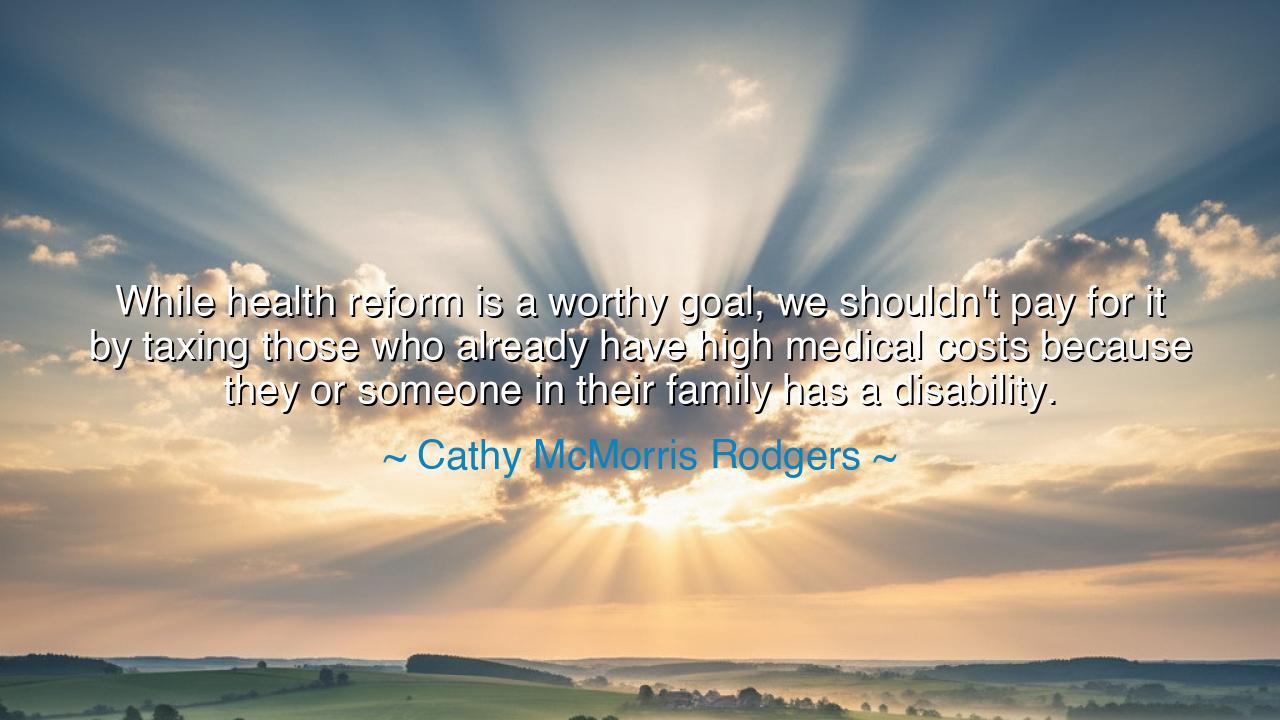
While health reform is a worthy goal, we shouldn't pay for it by
While health reform is a worthy goal, we shouldn't pay for it by taxing those who already have high medical costs because they or someone in their family has a disability.






Hear the words of Cathy McMorris Rodgers, spoken with the force of justice and compassion: “While health reform is a worthy goal, we shouldn't pay for it by taxing those who already have high medical costs because they or someone in their family has a disability.” In this saying lies a warning and a plea: a warning against building fairness upon the backs of the already burdened, and a plea that society remember the most vulnerable when crafting its laws. She speaks of reform, yes, but she also reminds us that not all progress is righteous, for progress bought with the suffering of the afflicted is no progress at all.
From the dawn of civilization, rulers and lawmakers have sought ways to sustain the many through the contributions of the few. But wisdom teaches that the strong must carry the heavy loads, and the weak must be shielded from excess. To place a tax upon those already drowning in medical costs is to press the drowning deeper beneath the waves. It is to confuse justice with cruelty, to mistake reform for sacrifice of the innocent. True reform must lift the fallen, not add weight to their chains.
Consider the story of Franklin Delano Roosevelt, who bore the weight of disability in his own body. Stricken with polio, his legs were weakened, yet his spirit grew fierce. He led a nation through depression and war, but he knew intimately the costs of medical care and the sting of limitation. If he had been asked to carry greater financial burden because of his condition, would it not have been an injustice? His life is a reminder that those with disability often already climb steeper mountains; to add more stones to their pack is a betrayal of the very ideals of compassion and fairness.
Rodgers’ words strike at the heart of equity. She does not argue against health reform itself, for she calls it a “worthy goal.” Instead, she teaches us that the means of reform matter as much as the ends. The ancients knew this too: in the writings of Aristotle, justice is described as giving to each what is due. To demand more from those already beset with sickness is to twist justice into its opposite. True reform must balance the scales, not tip them further against the frail.
The lesson is simple yet profound: a society reveals its character by how it treats those who suffer. If we ask the strong to give more, they are ennobled; if we ask the weak to give more, they are crushed. Thus, every citizen must question policies that claim to improve the whole while quietly exploiting the vulnerable. Progress cannot be real if it sacrifices the very people it claims to serve.
Practical action follows: advocate for reforms that protect families living with disability rather than burden them. Speak against laws that deepen inequality, and support systems that spread the weight across shoulders more able to bear it. In personal life, carry the same spirit—do not ask those already weary to give more, but step forward yourself when strength is needed.
So let Rodgers’ words be remembered not as mere policy but as moral teaching: that reform without compassion is ruin, and justice without mercy is empty. The measure of a people is not found in the towers of their wealth or the grandeur of their reforms, but in whether the widow, the orphan, and the disabled are cared for without being taxed beyond their endurance.
Let us then vow, O hearers of wisdom, to build systems of health and law that raise up the afflicted rather than weigh them down. For only then will reform be true, and only then will the name of justice shine without stain. This is the charge Rodgers gives us, and this is the torch we must bear forward into the generations to come.






AAdministratorAdministrator
Welcome, honored guests. Please leave a comment, we will respond soon